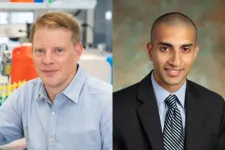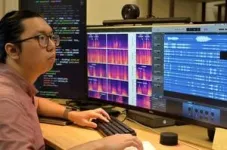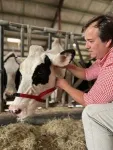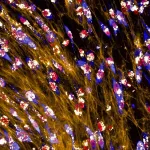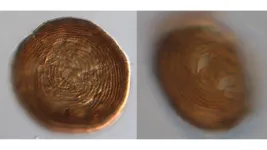In a collaboration between the Fralin Biomedical Research Institute at VTC and Carilion Clinic, researchers learned that by preserving large superficial leg veins intended for coronary bypass grafting in a mixture of the anticoagulant heparin and blood, rather than heparin and saline, the veins were better protected from cell and tissue damage.
Their findings, published in January in the Journal of Vascular Research, could inform surgical practices and enhance the long-term success of vein grafts in coronary bypass surgeries.
“Ultimately, we're putting healthier blood vessels back into patients,” said Scott Johnstone, assistant professor at Fralin Biomedical Research Institute and co-author on the study.
According to Mark Joseph, a Carilion Clinic cardiothoracic surgeon and co-author, the hope is that the findings will inspire change in clinical practice and the development of newer solutions to use with saphenous vein grafts for the nearly 400,000 patients who undergo coronary artery bypass graft procedures in the United States each year.
In severe cases of coronary artery disease, blood flow to the heart is impeded, which can lead to a heart attack and heart damage. Surgeons improve blood flow to the heart by using veins from the leg to reroute the blood flow in the heart. During these procedures, surgeons remove a section of vein and typically preserve it in a saline solution for two to four hours until it’s needed.
A decade or more after surgery, however, 50 percent to 60 percent of those grafts fail.
Meghan Sedovy, a Translational Biology, Medicine, and Health Graduate Program doctoral student working in Johnstone’s lab at the Fralin Biomedical Research Institute, was working on a different research project when she noticed severe damage to the endothelial lining of saphenous vein cell tissues. What was happening to those innermost cellular layers?
Sedovy brought it to Johnstone’s attention, and he started a conversation with Joseph and other colleagues, which led to another question: Could they do more to preserve the endothelium?
Joseph and Johnstone designed a study to find out.
What they did
Carilion Clinic surgeons and their operating room staff used standard techniques to remove blood vessels from patients’ legs for use during coronary bypass procedures. In roughly half of surgeries, veins were preserved in a heparinized saline solution, the standard of care, and the rest were preserved in heparinized arterial blood. Heparin is used to decrease clotting.
At the end of the surgeries, Sedovy transported the preserved, unused vein segments back to Johnstone’s lab for analysis.
The study required a coordinated effort between researchers in Johnstone’s lab, part of the research institute’s Center for Vascular and Heart Research, and surgical teams with Carilion Clinic’s Cardiovascular Institute.
“The ability to collaborate with our colleagues at Fralin Biomedical Research Institute has been very rewarding,” Joseph said. “This collaboration is vital for patient care and to continue to find ways to improve long-term outcomes.”
What they found
While other studies have shown positive results with veins preserved in blood, researchers found that heparinized arterial blood provided better nutrients when the veins were outside of the body awaiting use as a bypass graft, which resulted in healthier endothelium.
“When you take away the endothelium, it leaves a layer of very sticky elastin and collagen, and that’s where things like platelets and immune cells can line up, and you end up with blood clots and blocked veins,” Johnstone said. After surgery, patients take antiplatelet therapies to reduce the risk of a heart attack.
Another challenge is putting a leg vein into the heart as a substitute for an artery. Arteries are not as abundant in the body as veins and usually cannot be taken out routinely for use in bypass grafting without consequences. “They’re intrinsically different, but there may be things that we can do to at least make those vessels better,” Johnstone said.
After examining unused vein back in the lab, the researchers found that:
Microscopic analysis of saphenous vein graft tissues revealed damage in saline treated veins.
Endothelial coverage improved when using the patient’s own heparinized arterial blood.
Heparinized patient blood also protected against oxidative stress, or tissue damage. “The blood-treated cells essentially implement antioxidants to mitigate that increase in oxidative stress,” Johnstone said.
Why it matters
During heart bypass surgery, success depends on the health and quality of the saphenous veins.
While some endothelial damage is inevitable, researchers said more research can help the veins stay as healthy, open, and unobstructed as possible.
“This particular study will shape our practice clinically,” Joseph said. “It will set up additional studies in finding the optimal solutions to maintain and improve the health of saphenous vein integrity, and hopefully translate to improved outcomes for patients. In addition, it may also affect other aspects of patient care where saline is often used as a common intravenous solution and inform us of any detrimental effects it can potentially cause to other organ systems.”
Johnstone said the research was an example of the benefit of working across institutions to improve health. “They are actively implementing the basic science to understand treatments better and change the way they treat patients,” he said.
The study was limited by its short duration and small sample size -- it included 25 patients. It specifically examined veins, but was not designed to look at patient outcomes and long-term results. “There are lot of questions that remain unanswered clinically. Further research could fill that gap,” Joseph said.
The research was supported by the American Heart Association.
END
